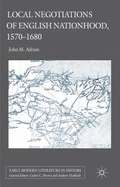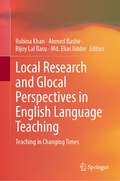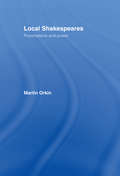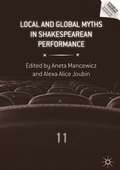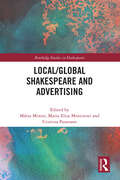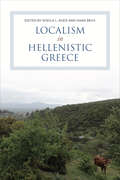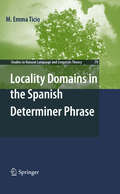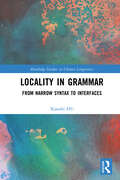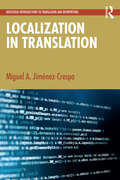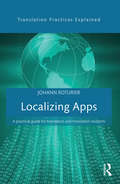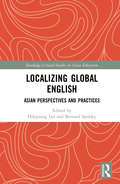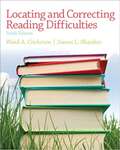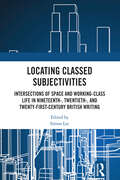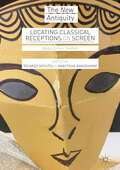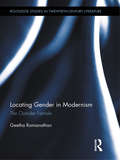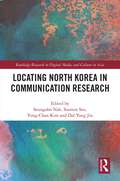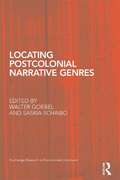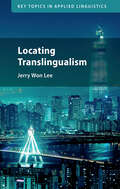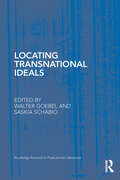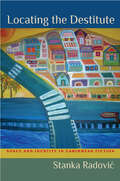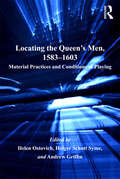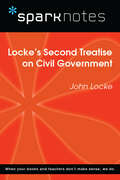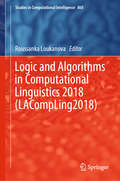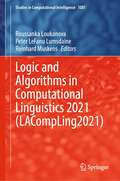- Table View
- List View
Local Negotiations of English Nationhood, 1570–1680
by John M. AdrianLocal Negotiations explores the vitality of early modern local consciousness. Even in an age of emerging nationhood, English men and women were still profoundly influenced by and even drew their primary identity from the parish, the town, and the county. This book examines how early modern writers invoke local places, traditions, and ways of thinking to respond to the larger political, religious, and cultural changes of the period. The opening chapter establishes the historical basis of local identity and describes the ways in which it was transformed in the second half of the sixteenth century. Each of the succeeding five chapters then focuses on a particular author and historical moment, and explores how local habits of thought are invoked to respond to a specific national initiative (political centralization, religious uniformity, court culture, civil war, and empire). Together, these chapters illustrate both the pervasiveness of local discourse and the range of possible responses to nationhood that it engendered. "
Local Research and Glocal Perspectives in English Language Teaching: Teaching in Changing Times
by Rubina Khan Ahmed Bashir Bijoy Lal Basu Md. Elias UddinThis book provides an overview of recent trends and developments in the field of English language education. It showcases research endeavors from a heterogenous group of scholars from different parts of the world and brings together perspectives from both experienced and emerging scholars. This book provides a platform for established as well as emerging practitioners and scholars in the field of English Language Teaching to share their research. It synthesizes local expertise and culture with innovative ideas from other contexts and brings theory and practice together in one volume.
Local Shakespeares: Proximations and Power
by Martin OrkinThis remarkable volume challenges scholars and students to look beyond a dominant European and North American 'metropolitan bank' of Shakespeare knowledge. As well as revealing the potential for a new understanding of Shakespeare's plays, Martin Orkin adopts a fresh approach to issues of power, where 'proximations' emerge from a process of dialogue and challenge traditional notions of authority. Divided into two parts this book: encourages us to recognise the way in which 'local' or 'non-metropolitan' knowledges and experiences might extend understanding of Shakespeare's texts and their locations demonstrates the use of local as well as metropolitan knowledges in exploring the presentation of masculinity in Shakespeare's late plays. These plays themselves dramatise encounters with different cultures and, crucially, challenges to established authority.
Local and Global Myths in Shakespearean Performance (Reproducing Shakespeare)
by Aneta Mancewicz Alexa Alice JoubinThis collection of scholarly essays offers a new understanding of local and global myths that have been constructed around Shakespeare in theatre, cinema, and television from the nineteenth century to the present. Drawing on a definition of myth as a powerful ideological narrative, Local and Global Myths in Shakespearean Performance examines historical, political, and cultural conditions of Shakespearean performances in Europe, Asia, and North and South America. The first part of this volume offers a theoretical introduction to Shakespeare as myth from a twenty-first century perspective. The second part critically evaluates myths of linguistic transcendence, authenticity, and universality within broader European, neo-liberal, and post-colonial contexts. The study of local identities and global icons in the third part uncovers dynamic relationships between regional, national, and transnational myths of Shakespeare. The fourth part revises persistent narratives concerning a political potential of Shakespeare’s plays in communist and post-communist countries. Finally, part five explores the influence of commercial and popular culture on Shakespeare myths. Michael Dobson’s Afterword concludes the volume by locating Shakespeare within classical mythology and contemporary concerns.
Local/Global Shakespeare and Advertising (Routledge Studies in Shakespeare)
by Márta Minier Cristina Paravano Maria Elisa MontironiLocal/ Global Shakespeare and Advertising examines the local/ global and rhizomatic phenomenon of Shakespeare as advertised and Shakespeare as advertising. Starting from the importance and the awareness of advertising practices in the early modern period, the volume follows the evolution of the use of Shakespeare as a promotional catalyst up to the twenty-first century. The volume considers the pervasiveness of Shakespeare’s marketability in Anglophone and non-Anglophone cultures and its special engagement with creative and commercial industries. With its inter-and transdisciplinary perspective and its international scope, this book brings new insights into Shakespeare’s selling power, Shakespeare as the object of advertising and Shakespeare as part of the advertising vehicle, in relation to a range of crucial cultural, ideological and political issues.
Localism in Hellenistic Greece (Phoenix Supplementary Volumes #61)
by Hans Beck Sheila AgerThe Hellenistic age witnessed a dynamic increase of cultural fusion and entanglement across the Mediterranean and Eurasian worlds. Amid seismic changes in the world writ large, the regions of central Greece and the Peloponnese have often been considered a cultural space left behind. Localism in Hellenistic Greece explores how various processes impacted the countless small-scale, local communities of the Greek mainland. Drawing on notions of locality, localism, local tradition, and boundedness in place, Sheila L. Ager and Hans Beck delve into some of the main hubs of Hellenistic Greece, from Thessaly to Cape Tainaron. Along with their contributors, they explore how polis and ethnos societies positioned themselves in a swiftly expanding horizon and the meaning-making force of the local. The book reveals how local discourses were energized by local sentiments and, much like an echo chamber, how discourses related back to the community and the place it occupied, prioritizing the local as the critical source of communal orientation. Engaging with debates about cultural connectivity and convergence, Localism in Hellenistic Greece offers new insights into lived experience in ancient Greece.
Locality Domains in the Spanish Determiner Phrase
by M. Emma TicioExamining its subject from a generative perspective, this highly detailed text deals with the syntax of nominal expressions. It focuses on empirical data taken from the Spanish language, though the author goes further to draw conclusions of wider theoretical interest from material culled from other languages too. The book considers crucial phenomena in the nominal domain, such as extraction out of nominal phrases and ellipsis in these phrases, as well as their modification. In doing so it provides the reader with a unified explanation of a number of phenomena that have not previously been analyzed under a single basic account. In particular, Ticio explores how economy notions interact with a number of functional categories, with the length and type of movements allowed, and with the existence of three internal domains within nominal expressions. She uses these observations to inform her analysis of the structure of arguments and adjuncts in nominal expressions, and of the potential these elements have for extraction. To test the empirical adequacy of her analysis, she employs phenomena such as the properties of attributive adjectives, partial cliticization and nominal elision in Spanish nominal phrases.
Locality in Grammar: From Narrow Syntax to Interfaces (Routledge Studies in Chinese Linguistics)
by Xiaoshi HuLocality in Grammar: From Narrow Syntax to Interfaces investigates the operation of locality conditions in syntax and semantics from a cross-linguistic perspective.It is claimed that there are two different types of locality conditions. One is the Generalized Minimality Condition (GMC), and the other is the Phase Impenetrability Condition (PIC). This book demonstrates that these locality conditions play different roles in different computational components of human language, and, therefore, cannot be unified as one constraint as proposed in the literature.The main idea of the book is that the two different locality conditions are sensitive to the difference between syntactic derivation and semantic interpretation and that of overt and covert syntactic derivations. Further investigation shows a more fine-grained distinction must be made between syntactic computations. It is true that GMC does not constrain overt syntactic derivations and PIC does not play a role in semantic interpretations; however, they both regulate covert syntactic computations.This book will inform postgraduate students and scholars in the field of linguistics.
Localization in Translation (Routledge Introductions to Translation and Interpreting)
by Miguel A. Jiménez-CrespoLocalization is everywhere in our digital world, from apps to websites or games. Our interconnected digital world functions in part thanks to invisible localization processes that allow global users to engage with all sorts of digital content and products. This textbook presents a comprehensive overview of the main theoretical, practical, and methodological issues related to localization, the technological, textual, communicative, and cognitive process by which interactive digital texts are prepared to be used in contexts other than those of production.Localization in Translation provides an interdisciplinary introduction to the main practical and theoretical issues involved in localizing software, web, video games, and apps. It discusses the many technological, cultural, linguistic, quality, economic, accessibility, and user-reception issues related to the different localization types. It also provides an updated overview of localization in an ever-changing technological landscape marked by advances in neural machine translation and AI. Each chapter includes a basic summary, key questions, a final section with discussion and assignments, as well as additional readings. Online resources with additional questions and assignments are included on the Routledge Translation Studies portal.This is the essential textbook for advanced undergraduates and graduates in translation studies and translation professionals engaged in localization practice.
Localizing Apps: A practical guide for translators and translation students (Translation Practices Explained)
by Johann RoturierThe software industry has undergone rapid development since the beginning of the twenty-first century. These changes have had a profound impact on translators who, due to the evolving nature of digital content, are under increasing pressure to adapt their ways of working. Localizing Apps looks at these challenges by focusing on the localization of software applications, or apps. In each of the five core chapters, Johann Roturier examines: The role of translation and other linguistic activities in adapting software to the needs of different cultures (localization); The procedures required to prepare source content before it gets localized (internationalization); The measures taken by software companies to guarantee the quality and success of a localized app. With practical tasks, suggestions for further reading and concise chapter summaries, Localizing Apps takes a comprehensive look at the transformation processes and tools used by the software industry today. This text is essential reading for students, researchers and translators working in the area of translation and creative digital media.
Localizing Global English: Asian Perspectives and Practices (Routledge Critical Studies in Asian Education)
by Hikyoung Lee and Bernard SpolskyEnglish is the most widely taught and learned language in the world and is used for communication among speakers from different language backgrounds. How it can be effectively taught and learned, what English means to, and how it can be "owned" by, non-native speakers of English in Asia and elsewhere, are all issues that warrant contemplation. This edited collection addresses these issues and more by looking at a wide range of topics that are relevant and timely in contexts where English is taught as a foreign language. The authors offer novel perspectives gleaned from theory and actual practice that can inform English language teaching in Asia and beyond. This book will be of interest to researchers, policymakers, curriculum developers, and practitioners in the field of English teaching and learning.
Locating And Correcting Reading Difficulties
by Ward Cockrum James ShankerIn this widely popular reading diagnosis and intervention handbook, beginning and experienced teachers alike find the assessment resources and tools they need to document a child’s strengths and areas of need–and get effective instructional strategies to teach skills that are missing. Locating and Correcting Reading Difficulties is organized around the sub-skills of reading and fits well with most major reading programs currently in use.
Locating August Strindberg's Prose
by Anna Westerstahl StenportThe setting of a novel is more than just an anonymous, interchangeable backdrop. In Locating August Strindberg's Prose, Anna Westerståhl Stenport argues that spatial setting is a key - though often neglected - tool for exploring the fundamentals of European literary modernism.Stenport examines the importance of location by exploring the prose of Swedish exile August Strindberg (1849-1912), challenging previous studies of the author that have focused on identity and subject formation. Strindberg wrote in both Swedish and French, situating his stories in various places across Europe - from Berlin to the French countryside, the Austrian Alps, and Stockholm - to purposely destabilize concepts of national belonging, language, and literary history. Close readings of Strindberg's prose find that his boundary-challenging narratives redefine and rewrite the meaning of a marginal literary identity. By contextualizing Strindberg against other early modernists, including Kafka, Conrad, Rilke, and Breton, Stenport emphasizes the burgeoning transnationality of literature at the turn of the last century.
Locating Classed Subjectivities: Intersections of Space and Working-Class Life in Nineteenth-, Twentieth-, and Twenty-First-Century British Writing
by Simon LeeLocating Classed Subjectivities explores representations of social class in British fiction through the lens of spatial theory and analysis. By analyzing a range of class-conscious texts from the nineteenth-, twentieth-, and twenty-first centuries, the collection provides an overview of the way British writers mobilized spatial aesthetics as a means to comment on the intricacies of social class. In doing so, the collection delineates aesthetic strategies of representation in British writing, tracing the development of literary forms while considering how authors mobilized innovative spatial metaphors to better express contingent social and economic realities. Ranging in coverage from early-nineteenth-century narratives of disease to contemporary writing on the working-class millennial, Locating Classed Subjectivities offers new perspectives on literary techniques and political intentions, exploring the way class is parsed and critiqued through British writing across three centuries. As such, the project responds to Nigel Thrift and Peter Williams’s claim that literary and cultural production serves as a particularly rich yet unexamined access point by which to comprehend the way space and social class intersect.
Locating Classical Receptions on Screen: Masks, Echoes, Shadows (The New Antiquity)
by Anastasia Bakogianni Ricardo ApostolThis volume explores film and television sources in problematic conversation with classical antiquity, to better understand the nature of artistic reception and classical reception in particular. Drawing inspiration from well-theorized fields like adaptation studies, comparative literature, and film, the essays in this collection raise questions fundamental to the future of reception studies. The first section, ‘Beyond Fidelity’, deals with idiosyncratic adaptations of ancient sources; the second section, ‘Beyond Influence’, discusses modern works purporting to adapt ancient figures or themes that are less straightforwardly ancient than they may at first appear; while the last section, ‘Beyond Original’, uses films that lack even these murky connections to antiquity to challenge the notion that studying reception requires establishing historical connections between works. As questions of audience, interpretation, and subjectivity are central to most contemporary fields of study, this is a collection that is of interest to a wide variety of readers in the humanities.
Locating Gender in Modernism: The Outsider Female (Routledge Studies in Twentieth-Century Literature)
by Geetha RamanathanThis book visits modernism within a comparative, gendered, and third-world framework, questioning current scholarly categorisations of modernism and reframing our conception of what constitutes modernist aesthetics. It describes the construction of modernist studies and argues that despite a range of interventions which suggest that philosophical and material articulations with the third world shaped modernism, an emphasis on modernist "universals" persists. Ramanathan argues that women and third-world authors have reshaped received notions of the modern and revised orthodox ideas on the modern aesthetic. Authors such as Bessie Head, Josiane Racine, T.Obinkaram Echewa, Raja Rao, Gabriel Garcia Marquez, Sembene Ousmane, Salman Rushdie, Ana Castillo, Attia Hossain, Bapsi Sidhwa, and Sahar Khalifeh, are visited in their specific cultural contexts and use some form of realism, a mode that western modernism relegates to the nineteenth century. A comparative methodology and extensive research on intersecting topics such as post-coloniality and the articulation between gender and modernist aesthetics facilitates readings of the modern in twentieth century literature that fall outside standards of western modernism. Considering the relationship between aesthetics and ideology, Ramanathan lays out a critical apparatus to enhance our understanding of the modern, thus suggesting that form is not universal, but that the history of forms, like the history of colonialism and of women, indicates very specific modalities of the modern.
Locating North Korea in Communication Research (Routledge Research in Digital Media and Culture in Asia)
by Dal Yong Jin Seungahn Nah Yong-Chan Kim Soomin SeoThis volume showcases continuity and change in communication with and within North Korea. By approaching the country from three distinct angles – news media, popular culture, and digital technology – this volume looks at media portrayals of North Korea, at cultural discourses in various media, and at the impact of new and emerging technologies.Taking a variety of communication studies perspectives, this book first addresses why North Korea matters for the general audience, academic audience, and communication scholars in particular, and how communication studies can benefit from studying North Korea. Drawing on insights from history and international relations, this book shows how the Cold War and Old-World Order shape media and communications in places like North Korea, as well as how the desire for people to communicate and to be understood can surpass such a regime’s tight control.This multifaceted look at communication within this fascinating and under-studied nation will appeal to scholars, researchers, and upper-level students of communication studies, media studies, journalism, new and digital media, and political communication.
Locating Postcolonial Narrative Genres: Locating Post-colonial Narrative Genres (Routledge Research in Postcolonial Literatures)
by Walter Goebel Saskia SchabioThis volume explores how postcolonial texts have determined the evolution or emergence of specific formal innovations in narrative genres. While the prominence of questions of cultural identity in postcolonial studies has prevented due attention to concerns of literary form and aesthetics, this book gives premium to the literary, aiming to delineate the evolution of specific narrative techniques as part of an emerging postcolonial aesthetics. Essays delineate elements of an emergent postcolonial narratology across a variety of seminal generic forms, such as the epic, the novel, the short story, the autobiography, and the folk tale, focusing on genre as a powerful tool for the historicizing of literature and orature within cultural discourses. Investigating the heuristic value of concepts such as mimicry, writing back, translation, negotiation, or subversion, the book considers the value of explanatory paradigms for postcolonial generic models. It also explores the status of postcolonial comparative aesthetics versus globalization studies and liberal concepts of the transnational, taking issue with the prominence of Western concepts of identity in discussions of postcolonial literature and the favoring of mimetic forms. This volume offers a unique contribution to the study of narrative genre in postcolonial literatures and provides valuable insight into the field of postcolonial studies on the whole.
Locating Translingualism (Key Topics in Applied Linguistics)
by Jerry Won LeeEncounters involving different cultures and languages are increasingly the norm in the era of globalization. While considerable attention has been paid to how languages and cultures transform in the era of globalization, their characteristic features prior to transformation are frequently taken for granted. This pioneering book argues that globalization offers an unprecedented opportunity to revisit fundamental assumptions about what distinguishes languages and cultures from each other in the first place. It takes the case of global Korea, showing how the notion of 'culture' is both represented but also reinvented in public space, with examples from numerous sites across Korea and Koreatowns around the world. It is not merely about locating spaces where translingualism happens but also about exploring the various ways in which linguistic and cultural difference come to be located via translingualism. It will appeal to anyone interested in the globalization of language and culture.
Locating Transnational Ideals (Routledge Research In Postcolonial Literatures Ser. #28)
by Walter Goebel Saskia SchabioThis volume defines versions of the transnational in their historical and cultural specificity. By "locating," the contributors contextualize historical and contemporary understandings of the fluid term "transnational," which vary in relation to the disciplines involved. This kind of historical and geographical "locating" implicitly turns against forms of contemporary transnational euphoria which, inspired by poststructural models of all-encompassing semiospheres, on the one hand, and by visions of the utopian communicative potential of new media like the internet, on the other, see national and ethnic paradigms as easily superseded by transnational agendas. By differentiating between various forms of transnational ideals and ideas in historical and geographical perspective since the Renaissance, the contributors aim to rediscover distinctions -- for instance between transnationalisms and cosmopolitanisms -- which neo-liberal transnational euphoria has tended to erase.
Locating the Destitute: Space and Identity in Caribbean Fiction (New World Studies)
by Stanka RadovicWhile postcolonial discourse in the Caribbean has drawn attention to colonialism’s impact on space and spatial hierarchy, Stanka Radović asks both how ordinary people as "users" of space have been excluded from active and autonomous participation in shaping their daily spatial reality and how they challenge this exclusion. In a comparative interdisciplinary reading of anglophone and francophone Caribbean literature and contemporary spatial theory, she focuses on the house as a literary figure and the ways that fiction and acts of storytelling resist the oppressive hierarchies of colonial and neocolonial domination. The author engages with the theories of Henri Lefebvre, Michel Foucault, and contemporary critical geographers, in addition to selected fiction by V. S. Naipaul, Patrick Chamoiseau, Beryl Gilroy, and Rafaël Confiant, to examine the novelists’ construction of narrative "houses" to reclaim not only actual or imaginary places but also the very conditions of self-representation.Radović ultimately argues for the power of literary imagination to contest the limitations of geopolitical boundaries by emphasizing space and place as fundamental to our understanding of social and political identity. The physical places described in these texts crystallize the protagonists’ ambiguous and complex relationship to the New World. Space is, then, as the author shows, both a political fact and a powerful metaphor whose imaginary potential continually challenges its material limitations.
Locating the Queen's Men, 1583–1603: Material Practices and Conditions of Playing (Hakluyt Society, First Ser. #14)
by Holger Schott Syme Andrew GriffinLocating the Queen's Men presents new and groundbreaking essays on early modern England's most prominent acting company, from their establishment in 1583 into the 1590s. Offering a far more detailed critical engagement with the plays than is available elsewhere, this volume situates the company in the theatrical and economic context of their time. The essays gathered here focus on four different aspects: playing spaces, repertory, play-types, and performance style, beginning with essays devoted to touring conditions, performances in university towns, London inns and theatres, and the patronage system under Queen Elizabeth. Repertory studies, unique to this volume, consider the elements of the company's distinctive style, and how this style may have influenced, for example, Shakespeare's Henry V. Contributors explore two distinct genres, the morality and the history play, especially focussing on the use of stock characters and on male/female relationships. Revising standard accounts of late Elizabeth theatre history, this collection shows that the Queen's Men, often understood as the last rear-guard of the old theatre, were a vital force that enjoyed continued success in the provinces and in London, representative of the abiding appeal of an older, more ostentatiously theatrical form of drama.
Locke's Second Treatise on Civil Government (SparkNotes Philosophy Guide)
by SparkNotesLocke's Second Treatise on Civil Government (SparkNotes Philosophy Guide) Making the reading experience fun! SparkNotes Philosophy Guides are one-stop guides to the great works of philosophy–masterpieces that stand at the foundations of Western thought. Inside each Philosophy Guide you&’ll find insightful overviews of great philosophical works of the Western world.
Logic and Algorithms in Computational Linguistics 2018 (Studies in Computational Intelligence #860)
by Roussanka LoukanovaThis book focuses mainly on logical approaches to computational linguistics, but also discusses integrations with other approaches, presenting both classic and newly emerging theories and applications.Decades of research on theoretical work and practical applications have demonstrated that computational linguistics is a distinctively interdisciplinary area. There is convincing evidence that computational approaches to linguistics can benefit from research on the nature of human language, including from the perspective of its evolution.This book addresses various topics in computational theories of human language, covering grammar, syntax, and semantics. The common thread running through the research presented is the role of computer science, mathematical logic and other subjects of mathematics in computational linguistics and natural language processing (NLP). Promoting intelligent approaches to artificial intelligence (AI) and NLP, the book is intended for researchers and graduate students in the field.
Logic and Algorithms in Computational Linguistics 2021 (Studies in Computational Intelligence #1081)
by Reinhard Muskens Roussanka Loukanova Peter LeFanu LumsdaineThis book assesses the place of logic, mathematics, and computer science in present day, interdisciplinary areas of computational linguistics. Computational linguistics studies natural language in its various manifestations from a computational point of view, both on the theoretical level (modeling grammar modules dealing with natural language form and meaning and the relation between these two) and on the practical level (developing applications for language and speech technology). It is a collection of chapters presenting new and future research. The book focuses mainly on logical approaches to computational processing of natural language and on the applicability of methods and techniques from the study of formal languages, programming, and other specification languages. It presents work from other approaches to linguistics, as well, especially because they inspire new work and approaches.
